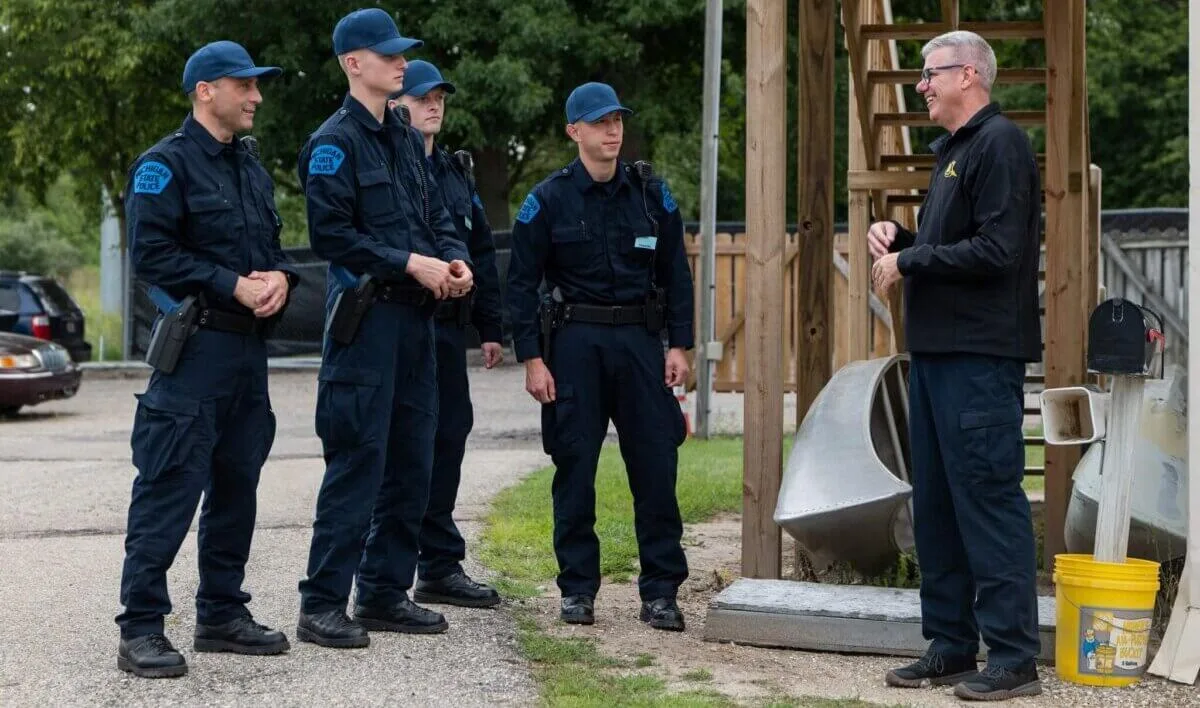
New police officers participate in "Trooper Recruit School" with the Michigan State Police. (Michigan State Police via Facebook)
A first-term state representative from Garden City is pushing for legislation that would prevent police officers from using deceptive tactics to solicit confessions from kids, which is legal in Michigan.
MICHIGAN—Did you know police can deceive suspects to get them to confess to crimes? It’s true. In Michigan, it’s a crime to lie to the cops—but they can tell you all the lies they want.
And for one Michigan lawmaker, the idea of law enforcement officers deceiving people to elicit confessions feels unethical. And when it comes to children, he thinks the tactic should be illegal.
“Young people are especially vulnerable to providing false confessions as a result of certain tactics used by law enforcement officers,” said state Rep. Dylan Wegela (D-Garden City), in a statement. “Unfortunately, some officers convince young people of something that is not true to get them to say things that didn’t happen. We want to make sure that doesn’t happen.”
House Bill 4436—which was introduced by Wegela last week—attempts to put an end to the practice. It would make any self-incriminating statements minors inadmissible in court, if it was obtained by police officers who told lies or used other deceptive tactics to solicit the confession.
Research has shown that false confessions are the leading cause of wrongful convictions in the United States, and that minors have higher rates of confessions from deceptive policing tactics.
Wegela said the one way to begin fixing the problem is to require cops to be truthful to children.
“It is common sense to prevent police officers from intentionally lying to kids,” he said.

Specifically, the legislation would prevent prosecutors from using self-incriminating statements obtained from a juvenile suspect who has been detained by police, if during the interrogation, the officer “knowingly communicated a false fact” about the evidence—or made an unauthorized statement about leniency in exchange for a confession.
It also carves out an exception to allow admission of the statement if “a preponderance of evidence”—the legal standard in most civil cases—shows that the deception did not cause the suspect to “involuntarily” provide a self-incriminating response, based on the circumstances.
In 2021, Illinois and Oregon reportedly became the first two states to ban police from lying to minors during interrogations. Maryland and Washington state also have similar legislation.
Wegela’s bill was referred to the House Committee on Criminal Justice for further review.
For the latest Michigan news, follow The ‘Gander on Twitter.
Follow Political Correspondent Kyle Kaminski here.
Politics

Michigan lawmakers look to break (another) state funding record for public schools
Democratic lawmakers are hashing out plans to bring state funding for Michigan’s public schools to another new, all-time high—and ensure teachers...

Mundy Twp. project gets state funding in effort to boost local manufacturing
More than $9 million awarded to a planned development project in Genesee County could provide a big boost to the local economy and help create...

It’s official: Your boss has to give you time off to recover from childbirth or get an abortion
Originally published by The 19th In what could be a groundbreaking shift in American workplaces, most employees across the country will now have...
Local News

More Michigan teens could soon take driver’s ed in their own schools
Privatization of driver’s education means that only 38 Michigan high schools offer affordable in-school driving classes for students. New grants...

That one time in Michigan: When we became the Wolverine State
How did Michigan become tied to an animal that's practically nonexistent there? Among the many nicknames that the state of Michigan has, arguably...






